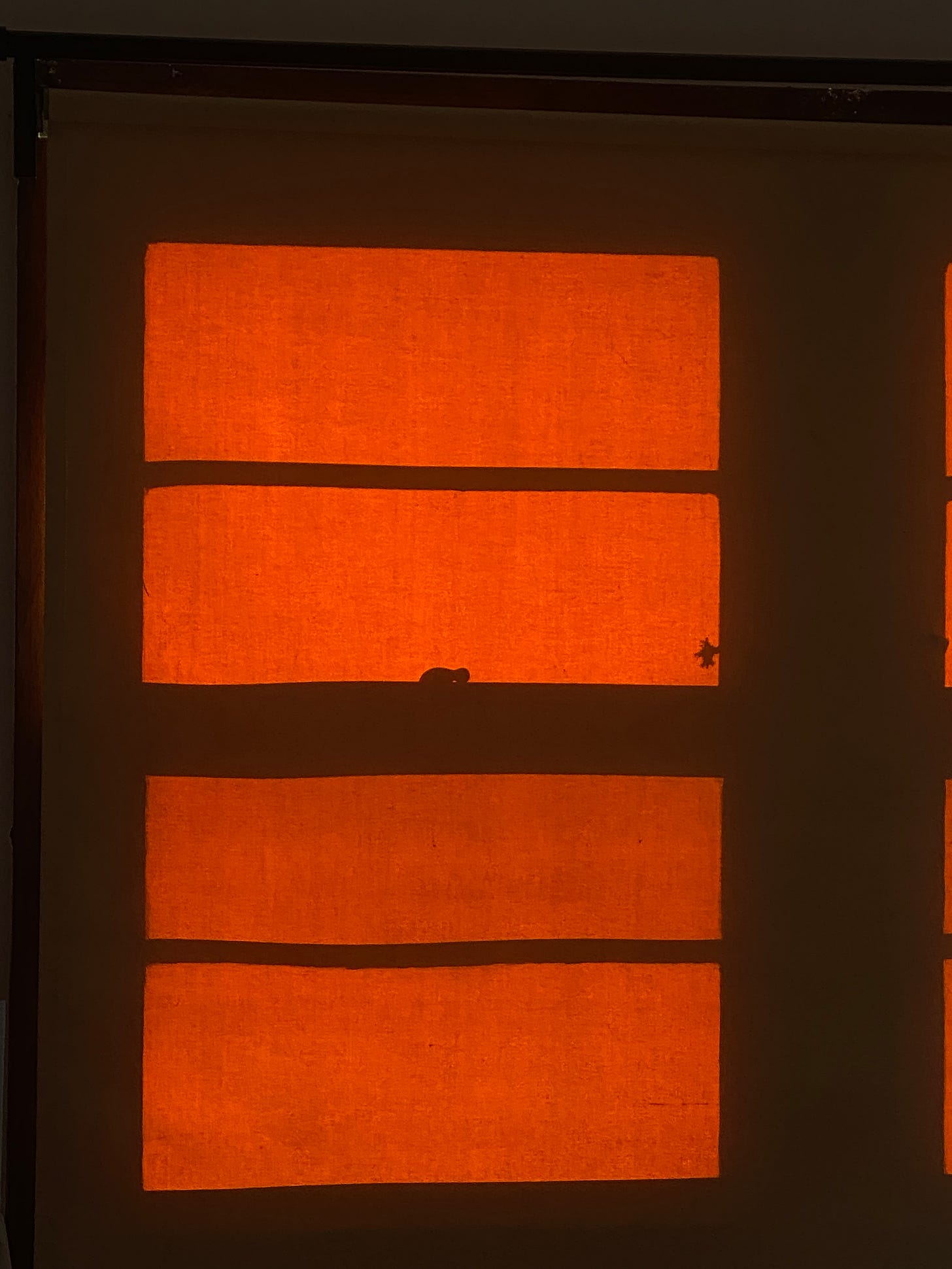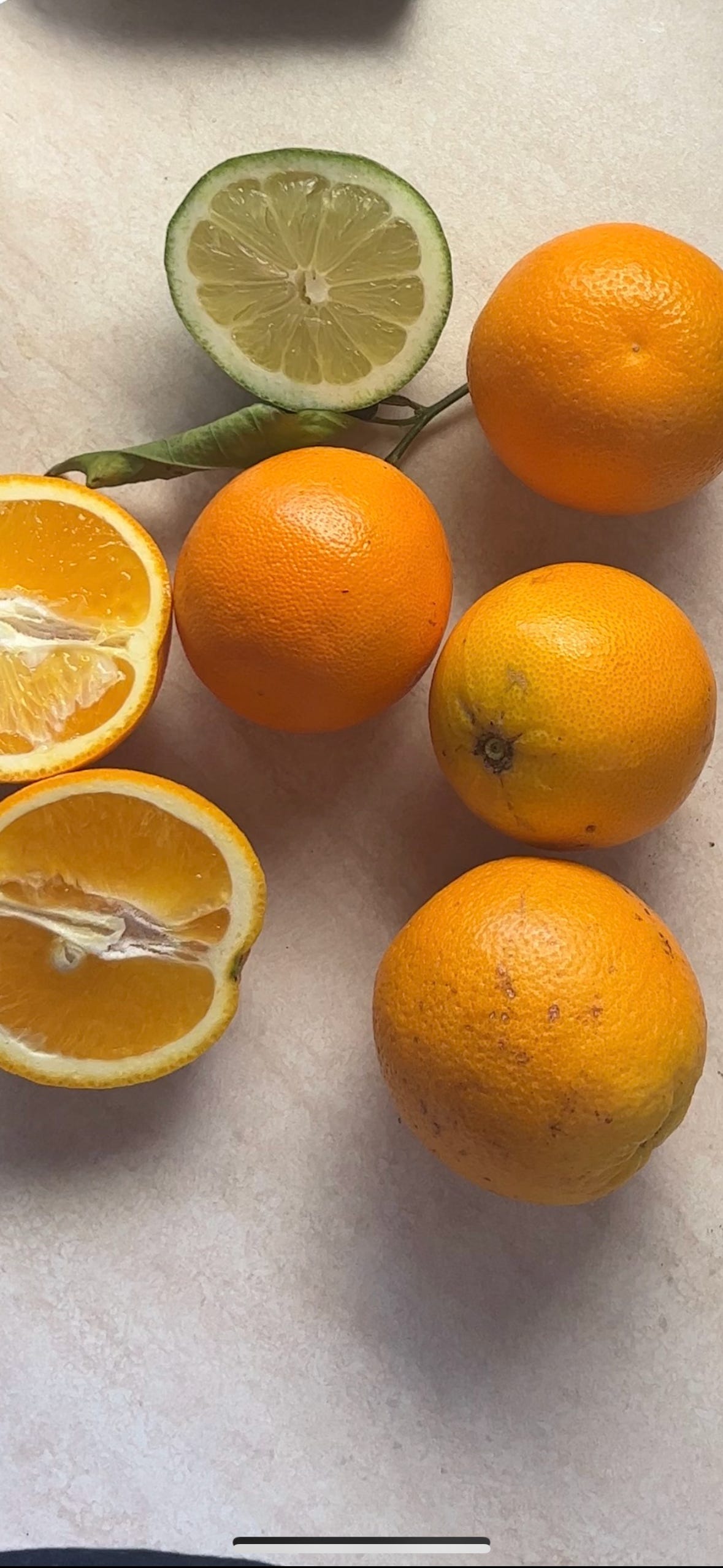Approaching five months sober, my Saturday night is spent in front of my iMac, navigating near misses between my elbows, a bowl of strawberry tops, and a half-finished, gone-cold eucalyptus tea. These are signs I have loved myself well. After dinner— a roast chicken for one that I reheated— I hand-squeezed myself some orange juice, dragging that unfortunate elbow across the bench through sticky orange blood.
I remember how an orange has reimagined love for me in many ways throughout my life. My father had peeled oranges for me up until I left home at 17, even if I was sullen or had upset my mother. In his absence, I started practising it as an act of care for my friends who in their late angsty, teen-hood hadn’t been able to justify the effort for themselves. Later I learnt the delight of hand-squeezing juice from fresh oranges from a spontaneous lover. Then I remember: the sensuality of a morning, sunlight, the care that is required to meet the mess of its making, the burst of flavour on your palette to enliven your sleepy mouth, the smell left on skin after the final sip has been devoured, a somewhat antiseptic reset for morning breath allowing self-consciousness to dissolve. Even though it was roughly 745pm, all of this rides on my half glass of colander strained oj and I am reminded that I do love myself. The best thing about an orange is that its profile never changes; it is always whimsical and satisfying all at once.
I was on the phone to a writer friend of mine newly returned to Paris, I told him about my waning will to exist in Australian cultural dissonance as a romantic, crowning Paris and Barcelona as the ultimate lovergirl’s safe haven. Laughing, he replied: “Of course, it’s literally in the Parisian walls”. By that he meant that the architecture of the city is intrinsically romantic, that it both demands and echos intimacy; it steals your glances, runs away with your imagination and demands you stay a little longer, leaving as I have done with ideals that beg to be relived. The cobblestones and terracotta chimneys a deliberate evocation of aliveness, informing people that they ought to live with liberty and intrigue in mind. This is an example of what my new muse (read: big, giant brain) Roger Scruton would describe as “where being and seeming coincide”. So much of a city, or of ourselves, is reliant upon how we are recognised. What Scruton says constitutes real beauty is our ability to be true. For our seeming and being to harmonise. Because he is a professor of aesthetics and because of his beliefs about beauty, I know that Roger Scruton would smell really good.
I have been doing a lot of wondering post break-up, post city-move, in the throes of sobriety, if I am any longer what I seem? And more than that, if I like how I seem. Especially as my baseline feeling changes, and the combination of being almost 27 and sober makes me no longer numb or afraid. Even moreso because I am actively building evidence that I can handle discomfort. In the frame of the Hinge app or a Raya profile, I am forced to reckon with how I can use my marketing skills to make myself seem closer to what I am, to achieve beauty on the screen that someone else will recognise as valuable.
The subconscious motivation here is a promise of what will happen when you get “hot” enough to be recognised as hot. For me at least, the loop goes something like this:
when I am hot enough someone hot will find me hot
when I am hot enough I will make a big break (get picked for something hot, go “viral”, have access to hotter stuff)
when I am hot enough, I will get hotter, and then I will never not be hot
All of this hinged to the need for a mirror to validate that a) I am hot, and b) that I am hot enough for the things that I find hot.
Aristotle was one of the first to talk about our potential for change. This potentiality is the inner power natural things possess to go from seed to tree. There is in some form, a knowledge within us of the ends we are seeking, just as a seed carries the genetic code of the tree it will become. Aristotle calls this deep proper knowing, virtue. How we get there, how we actualise, how we become the tree, is what he calls skill.
To relate it to my XXL Ganni bag, potential is the total capacity of the bag, and actuality is the bag’s real contents at any given time. Skill is how we discern and navigate what goes in the bag. Virtue is to make our choices relevant to a beneficial future. i.e. When you live in the city, it is skilful to take a fully juiced portable charger with you, a full waterbottle, some gum, charged airpods, a journal, a pen and a book, when your desired end is to make your voyage with as minimal anxiety as possible. The skill is really just you pre-empting your own needs.
Something I have been fighting off for years is the way that late-stage capitalism disrupts us from virtue; from remembering what it’s all for and where we are going. From actualising. From having a good fucking time. As long as there can be more problems made of things, the more we will keep buying bigger bags to fit more shit into. The more we keep believing in a “hot enough” just out of reach, the easier it is to sell things to us that promise to bridge that gap. We become self-diagnosed problems, forever trying to heal the never-ending brokenness that is defined for us.
Modernism, even its art, relies on this sort of desecration and uglification of the culture; a deliberate splitting apart of the hopes and beauties we have remaining. We see this in modernist architecture with its angular, minimalist lines and uncaring facades. There is a certain charm to disenchantment that the upper-echelon arthouse skater/surfer community weaponises. It provides a facade of distinction, that intimates that you haven’t been taken in by anything and that makes you superior. This separateness is what happens when we make beauty and art a substitute for religion, and when it fails to give us our redemption. We become angry at beauty that does not transport us to purity, so we seek revenge on it.
This is typified in the way our culture treats modern celebrities, as we watch their disfigurement with glee and horror simultaneously. Culture still loves to consume a woman and then discard her, as they did with Marilyn and Britney and Anna Nicole. Serves her right for being beautiful! And the conveyor belt moves even faster still with modern Youtubers and Tiktokers whose time in the sun averages but a few years. See the body horror playing out in real time as Kris Jenner launches her new face, and Tiktok stars livestream their nose job healing process.
The most real thing, is how we are left feeling. We know we are being uglified by the oversimplification of our personalities, of the flattening of human texture through therapy speak and image augmentation and filters. We notice that the things that didn’t use to bother us, are just three more targeted ads away from becoming a ChatGPT search that tries to deny the effect, like “natural alternatives to botox”. My search history is so telling that my virtue needs revival.
Another theory classic, Immanuel Kant, talks about reason consisting of two types of knowledges. The first being a priori knowledge, or knowledge that is derived from mathematical rules, tautologies or definition. The second being empirical knowledge which is interested with the sensations something gives us. We have seen a fixation on a priori in our modern classifications of beauty. Defined by algorithm, by the golden ration, by symmetry, by mm of juvaderm, this physical plane of control is what can be bought and sold most directly. We can say, by the laws of hotness, someone with many followers must be beautiful. Someone with a symmetrical face automatically becomes beautiful because that is the tautology: facial harmony equals beauty.
What remains lesser considered, mainly because it’s harder to tamper with and artificially inseminate, is the empirical knowledge of beauty. This sort of knowledge has to do with essence. With how we make those around us feel. With how we feel to be in others’ presence. It is difficult at times to place value on how we feel when there is no-one but ourselves to experience it. We are free beings in this way, perceiving the “rightness” of things in relation to the world around us. And ourselves. Do I fit in? Am I graceful? Am I kind? Do I lend something of importance to the world around me? Roger Scruton talks about how the deepest purpose of beauty is to search for a home. To make things belong to one another. And how being at home is to see yourself as another.
This is what Aristotle would call actualising. Of making a home of ourselves. Of our being and seeming colliding. And, it is also what Instagram gurus tell us is authenticity as they sell you their next course on how to fix your childhood trauma so you too can be more authentic. Some of them are really good, actually.
It is hard to not instrumentalise yourself or someone else in the process of becoming. To not turn yourself into an object that requires constant mending. It is disencouraged by everything we are surrounded by to stay with the discomfort of being, to deny living in our empirical data, our wrinkles, our insecurities. Here, deep in mine, I turn yet more of my ephemeral life experiences into documents for other people to skim past and assign value to. This is not itself a problem, I don’t think. I wish I could ask Roger Scruton. It only becomes one when I make the orange juice because I said it was good to do, without really tasting it. Resenting the spillage on the bench.







Definitely resonate with the pains of being a lovergirl in Australia – I always curse my romantic notions, but at times remember that I was raised as a French woman, and that is where all of this romantic, idealistic and deeply loving stems from – it is not something I can escape, it is deep within my bones. Paris here we come?